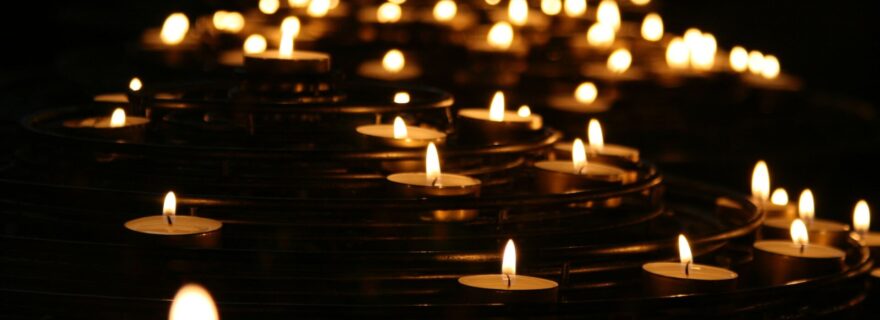All souls
2 November is All Souls' Day. Traditionally, people get together to remember those who have passed away, telling stories to revive the memory of their loved ones.
Why tell stories of those before us?’
wonders Saskia Hamilton in All Souls, her last book of poetry:
‘They already spoke them, or held their tongues – fell silent. A lifetime to overcome the prohibition not to. But the lens is all wrong these days. I’d thought it a sunset, a sketch, told again as all sunsets are. To say something sincerely yet inauthentically is the danger.’
It appears that the stories of the thousands of women, men, children who have gone before us, murdered in Israel, Gaza and the West Bank, remain unspoken. The reason for this may be that what we would like to say about this, as fellow human beings, is bound to fall short. Well-intentioned, but soon worn out.
Yet, as lawyers, we have something to say, something to teach and something to learn.
Human rights
The words may not be very poetic:
‘Whereas recognition of the inherent dignity and of the equal and inalienable rights of all members of the human family is the foundation of freedom, justice and peace in the world,
Whereas disregard and contempt for human rights have resulted in barbarous acts which have outraged the conscience of mankind …’
but they have lost nothing of their relevance in the 75 years since they were written. These are the opening lines of the Universal Declaration of Human Rights, adopted by the UN General Assembly on 10 December 1948. It is unlikely that this year’s anniversary will be celebrated with any great festivities. Which rights are not violated by the scourge of war which, in the words of the UN Charter, brings ‘untold sorrow to mankind’? The right to life, liberty and security of person? The freedom from want, the freedom from fear?
Some barbarous acts have been committed in broad daylight, with cameras running to maximise the humiliation and dehumanisation of the victims. Others have been committed under cover of the fog of war, with cameras recording the next morning what were houses once.
In these extreme circumstances, all that human rights law has is its backbone to lean on. It can expect no help today from the courts and the tribunals, from the treaties and procedures. They come later.
Private law courts, for example
What help can be expected from the courts? Private law courts tend to focus on tortfeasors and their victims. Those who take another person's life, leaving their family and dependents in shock and with great grief, commit a tort and will be liable for compensation for material and immaterial damages. The same goes for those who facilitate such atrocities. But even the government that does not provide adequate protection against the threat of such calamity may be liable. Governments can be called upon to increase protection pre-emptively. If calamity has already occurred, in the absence of adequate protection, they will have to compensate the victims. Subsequently, the infliction of harm by a government in response to acts of terror can be justified to some extent. But if there is a real possibility to distinguish between protecting civilians and combatting threats to society and if there is an opportunity to spare civilians, the government will have to act accordingly, failing which the government will be liable for the damages suffered by the civilians.
These examples are taken from decisions of Dutch civil courts. Before Israeli civil courts, too, successful civil actions for damages have been brought against the State of Israel: for property damage, bodily injury, or wrongful death resulting from the actions of security forces.
But, as said, courts come later. What matters now, today, is the conscience of those who decide – on war, on life and death, on the future of their societies. Are they still capable of recognising the inherent dignity of all members of the human family? What are their basic values – what stories did their parents tell them when they were young? What stories do their friends abroad tell them today? What stories do they expect will be told after the fighting has ended? That it appeared plausible that a nation can achieve security – let alone freedom, justice and peace – by denying it to others?
Of all times
In All Souls, Saskia Hamilton shows in a subtle way that the human tragedy that we now face, is of all times, way before the Universal Declaration was proclaimed. We witness the poet and soldier Sir Philip Sydney dying in Arnhem, 1586, when
‘by the banks of the IJssel
an “unfortunate hand” sent forth a bullet
that broke the bone in his thigh’,
and in the following lines, centuries later, during the battle of Arnhem in 1944, a woman – whose house is packed with 300 wounded; children sheltering in the basement – climbed the cellar stairs,
‘and at the top she found “a hole piece
of the wall under the window ...
blown away,” the wounded with it.’
Why tell stories of those before us? We should not fall silent. We must have something to say. Once again, the international community faces the challenge to reaffirm faith in human rights and international justice. Our only hope must be that the current crisis will lead, as happened after previous catastrophes, to a stronger world order, one that is capable of offering real and effective protection to all members of the human family. And for this, we need stories: old ones, new ones. From our colleagues, from our students.




0 Comments
Add a comment